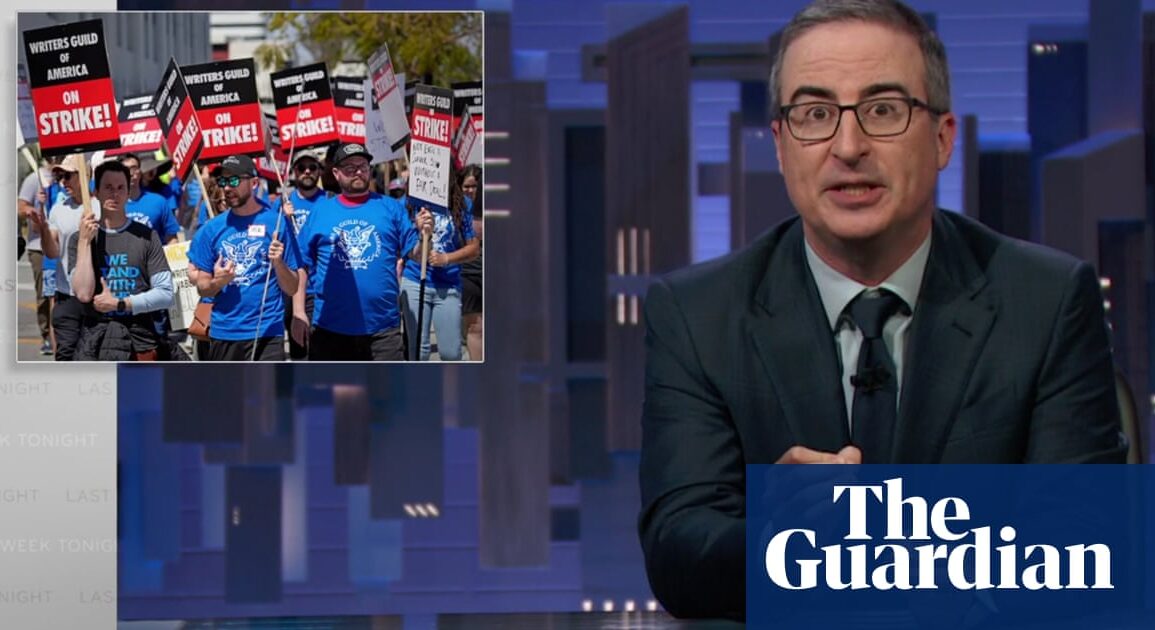
For the first time since April, John Oliver returned to Last Week Tonight on Sunday evening with five months’ worth of recapped news and harsh words for the studios who only reached a deal with the Writers Guild of America last week.
“I’d have loved to have covered all of these stories back when they originally happened,” Oliver said after blistering through old headlines such as Donald Trump’s mugshot, King Charles’s coronation and the Titan submersible disaster. “I wish so much I could have told you these jokes at the time, but I couldn’t because our writers, the people who wrote those jokes, were forced to strike for a fair contract for the last five months.”
Oliver described the strike as “an immensely difficult time – not just for them, but for everyone else working on this show and many others who could no longer do their jobs”. The 148-day strike, one of the longest in the union’s history, “happened for good reasons”, he said. “Our industry has seen its work severely squeezed in recent years. You’ve probably seen stories about writers and actors whose work you may even recognize, routinely not making enough to qualify for health insurance or afford basic needs.
“So the Writers Guild went on strike and thankfully won, but it took a lot of sacrifices from a lot of people to achieve that,” he continued. “And while I’m happy that they eventually got a fair deal and immensely proud of what our union accomplished, I’m also furious that it took the studios 148 days to achieve a deal that they could have offered on day fucking one. But hopefully this might encourage others, from auto workers to Starbucks baristas to healthcare providers, whether they are in unions or would like to be, to find power in each other.”
Oliver then segued into Last Week Tonight’s main segment on prisoner healthcare in the US, “because this is who we are”. He conceded that some people take objection to people behind bars receiving healthcare, but the constitution requires that we provide adequate healthcare to prisoners and a 1976 supreme court decision found that denying prisoners healthcare constitutes “cruel and unusual punishment” at odds with the eighth amendment. “Yet despite all of that, the quality of care prisoners receive is abysmal,” said Oliver, with dire consequences given the rapidly aging prison population; between 1999 and 2015, the number of people 55 or older in prisons increased by 264%.
The host diagnosed one of the major problems with prison healthcare: the outsourcing of care to private companies with perverse profit motives. More than half of states hire private companies to provide at least some of their prison healthcare, now a $4bn industry. A 2020 ProPublica investigation found that prisoners relying on the five largest private healthcare companies had higher death rates than facilities run by government agencies, largely attributable to the payment model: companies on a fixed contract – the same reimbursement per prisoner regardless of care – are incentivized to cut costs.
Oliver noted a company called Wexford, which had a de facto policy in Illinois of “one good eye” – when a 69-year-old prisoner got cataracts in both eyes, the prison doctor asked her which one she wanted fixed, the right or the left. “Which is clearly an impossible question!” Oliver exclaimed. “It’s like someone asking which Property Brother you’d like to kill. The only acceptable response to either question is both, why are you making me choose?”
For many, the poor quality and neglect of private prison healthcare has deadly consequences. Oliver pointed to a story of one Arizona prisoner with 10 months left on his sentence for vehicle theft who was denied diagnostic tests and treatment for what appeared to be cancer; his kidney cancer, which should have been survivable if treated in time, became terminal.
Based on a number of similar examples in different states, “it’s hard to escape two conclusions: that all the options currently on the table are bad, and that the reason they are allowed to be so bad is because of who this care is for,” said Oliver.
It can be difficult for some to care about prisoners, “and I also get that their healthcare may be especially difficult to rally around as so many on the outside don’t have healthcare themselves,” he added. “But the fact remains: prisoners are people.”
He offered some solutions, first and foremost no longer outsourcing prison healthcare to private companies. But it was a much more complicated and bleak web than just prison healthcare companies. “It is impossible to separate this issue from the much larger conversations about universal healthcare and prison abolition,” Oliver concluded. “Like so many stories that we cover, this one ends at the perpetual elephants in the room: that the US doesn’t guarantee any of its citizens the dignity of good healthcare, and it puts too many of its people in cages – cages where many will needlessly die.”
This post was originally published on this site be sure to check out more of their content.









